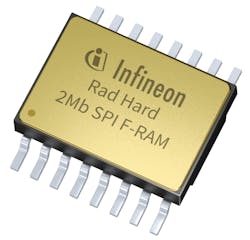Radiation-hardened serial interface ferroelectric RAM (F-RAM) for space applications introduced by Infineon
MUNICH – Infineon Technologies LLC in Munich is introducing a radiation-hardened serial interface ferroelectric RAM (F-RAM) for use in extreme environments in space applications.
The devices are more energy efficient than non-volatile EEPROM and serial NOR Flash devices for space applications. It offers support for the industry standard Serial Peripheral Interface (SPI) protocol.
The QML-V qualified F-RAM offers instant non-volatile write technology, and more than 100-year data retention for space applications.
The device can replace serial NOR flash and EEPROMs, and is for data logging of mission critical data, telemetry storage, command and control calibration data storage, and boot code storage solutions for microcontrollers, FPGAs, and ASICs.
Related: New technologies drive bulk-memory solutions
The 2-megabit density F-RAM with SPI offers 10 trillion read/write cycles and 120 years data retention at 85 degrees Celsius, at an operating voltage range of 2 to 3.6 volts. The lowest operating current is 10 milliamps maximum, with an extreme low programming voltage of 2 volts.
The radiation-hardened F-RAMs also are suitable for avionic and other applications that require military-standard temperature grades reaching from -55 to 125 C.
Additional features include a small footprint with 16-pin ceramic SOP packaging. The DLAM QML-V qualified devices have radiation performance of more than 150 kilorads of total-dose radiation; single-event latchup of more than 114 MeV·cm 2/mg at 115 C; are immune to single-event upsets; and have a single event functional interrupt (SEFI) of less than 1.34 * 10-4 err/dev.day.
More information is online at www.infineon.com.

